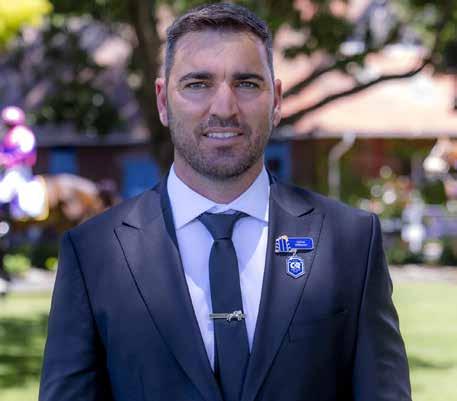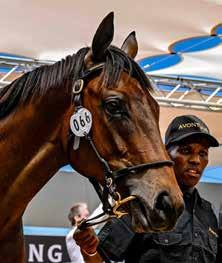
10 minute read
Cape Of Good Hope
James Thomas chats with Justin Vermaak of Cape Racing Sales after the South African auction house enjoyed its best yearling sale for eight years – it is an organisation that is brimming with enthusiasm with increased investment, enjoying a better trading environment with the lifting of the export ban, its new Premier Sale is on the horizon and there is a valuable race for sale graduates, The CRS Big Cap.
AFTER A TUMULTUOUS few years that saw the industry pushed to the brink, positivity is once again prevailing around the South African racing and breeding scene.
New operators have pumped significant investment into prize-money, which in turn has driven demand at the yearling sales. And this demand is being matched by the ambition of the Cape Racing Sales (CRS) team, who are implementing some bold new ideas across the established sales landscape.
The 2024 CRS Premier Yearling Sale, which was held in Cape Town’s waterfront convention centre in January, posted the kind of year-on-year stats that any auction house would dream of.
Turnover rose by 46 per cent , the average price was up by 22 per cent and the median climbed fully R100,000, a gain of 33 per cent.
Arguably most impressive was the clearance rate, as 123 lots were offered and 121 sold at a clip of 98 per cent.
However, despite the strength of these results, CRS has moved ahead with a restructured calendar that has effectively seen Cape Town’s Premier Sale split in two.
In its place there is now the Summer Sale, which took place in the traditional Met week slot in January, and the new incarnation of the Premier Sale that is being staged at Kenilworth in mid-March.
Justin Vermaak, CRS’s racing and bloodstock executive, explains these changes were already under consideration prior to the somewhat unexpected surge in demand.
“When we came in and took over the running of the sale [from Cape Thoroughbred Sales in 2022], South Africa had a massively reducing foal crop, so there were less and less yearlings available to sell each year,” he says.
“And the South African breeding industry is shaped more towards the middle-distance, Classic-type of breeding, so when you factor that into a declining foal crop, we were finding less and less early types who were ready to be sold in January.
“It would be the equivalent of selling yearlings in Europe in June, and we don’t have as many early, precocious sorts as they do in places like Australia.
“So we were discussing whether we get rid of the January time slot in its entirety and just push our Premier Sale back to March. As we were thinking about this, we held the 2024 auction in January thinking it would probably be our last.”
But the barnstorming results gave the team pause for thought.
“The results from the 2024 January Sale were so good that it made us think it would be a travesty for us to give up this time slot,” Vermaak continues. “We decided to change tack, and that we should tighten up our January Sale into something more boutique and select, and target the big, forward, precocious juveniles, and host that during the Met week when everyone, internationals and South Africans, comes to Cape Town.

“Then we can move onto March with the better-bred, Classic types at a two-day sale for the bulk of our Premier Sale horses.”
The first part of this plan has certainly paid dividends. The inaugural Summer Sale generated turnover of R46,655,000 (£2,009,290) and a median of R500,000 (£21,500).
The average price of R613,882 (£26,450) was the highest at a South African yearling sale since 2017, while the market was topped by a Vercingetorix colt who fetched R2.2 million from Laurence Wernars of Triple 8 Clothing.
“We came up with a tight book for January, and it was the record average price at a yearling sale in the last eight years,” says Vermaak.
“So we knocked it out of the park in terms of what we’re trying to achieve in January. For a South African sale to achieve a median of R500,000 is quite something.
“The clearance rate was good, as well as the average. I did expect that in a way because obviously we tightened the catalogue right down to 100 horses, so you can expect these sorts of results in a strong market, which is where we’re at the moment.”
Vermaak has taken inspiration from around the bloodstock world when tailoring CRS’s new offering.
If the Summer Sale is intended to be somewhere between the Goffs London Sale and the Doncaster yearling sale, namely a boutique affair majoring in precocious yearlings and all round razzmatazz, then the upcoming CRS Premier Sale is aiming to be something like the Magic Millions Gold Coast Yearling Sale. As well as an auction of blue-chip stock, there will, in due course, also be a festival of lucrative racing.
Two hundred and fifty eight lots have been catalogued for the two-day sale, which takes place on Thursday, March 13 and Friday, March 14.
Day one is all about pedigree and showcases some of the best-bred yearlings South Africa has to offer, with almost a third of the catalogue made up of lots by champion sire elect Vercingetorix, three-time leading sire Gimmethegreenlight and One World, who last year broke the record for number of winners by a South African first-season sire.
For a flavour of what’s in store at the Premier Sale, the catalogue contains a half-brother to dual South African champion Princess Calla (Lot 62 from Maine Chance Farms); a half-brother to Cape Guineas hero Snow Pilot out of the dual Grade 1 winner Snowdance (85 from Drakenstein Stud); and a sibling to champion miler Vardy (148 from Klawervlei Stud).
All three colts are by Vercingetorix.
“What we found was that over the last couple of years, there’s been a big push from Western Cape-based breeders to sell more horses in the Cape, rather than travelling them up to Johannesburg,” says Vermaak.
“We’ve gone to market with the March Sale, and we’ve found a lot of breeders and vendors very keen on the idea and have supported us in a massive way. That includes all the big stud farms like Drakenstein and Maine Chance, which has been fantastic.”
While acknowledging CRS' early successes, Vermaak stresses the level of support the fledgling sale company has received is not taken for granted.
“This is only our third year, and obviously it’s easy to talk the talk,” he says. “But breeders who are breeding commercially can’t afford to have a flop sale because they need the income to keep their businesses alive. It’s a big leap of faith to place their top horses with us, but a lot of them have done and have been rewarded for doing so.”
This year’s race meeting will feature the first running of The CRS Big Cap, a 7f slot race that Vermaak describes as “a handicap with conditions” aimed to attract as broad a field as possible.
There are 16 slots available at R325,000 apiece, with runners competing for a slice of the hefty R5 million prize fund. The race is open to all graduates of all CRS auctions.
CRS is also awarding the groom of each runner R12,500, an initiative that Sale and the Easter Sale, either side of Cape Town. The Hong Kong International Sale at Sha Tin also takes place earlier in March.
Our sales company is owned by the racing operator, all the profit that it makes goes directly into the prize pot
“We’re building a week to end the summer season off in Cape Town, where the whole country comes for the sale, stays for the race meeting and then we close the season up and all move to Durban for the winter,” says Vermaak.
“We positioned the Premier Sale so that we’re well placed in line with the Inglis Melbourne and Sydney Easter sales. The Hong Kong Jockey Club is a big buyer of ours and they’re coming out in March, and we didn’t want to clash with those two.
“We’re trying to fit into the middle of the whole southern-hemisphere calendar now that we have direct exports and horses are being shipped more regularly.”
TALK OF DIRECT EXPORTS brings into sharp relief the change in outlook in South Africa.
In the not too distant past the country’s horses were essentially cut adrift from participating on the international stage after an outbreak of African Horse Sickness in 2011 led the European Union to impose a ban on direct exports. The restriction was lifted in March 2024 after 13 painful years.
There have already been several notable trades that would likely not have been possible without the opening up of exports.
John Messara stepped in to purchase the Grade 1 South African Fillies Sprint heroine October Morn, who was due to visit Arrowfield stallion The Autumn Sun.
Team Valor has purchased Equus champion Quid Pro Quo with the long-term aim of shipping the daughter of Lance to compete in Dubai, while Mid Winter Wind won a Class 3 handicap at Sha Tin on his first start since leaving Sean Tarry.
The latter years of the ban coincided with the Covid-19 pandemic, the effects of which played a part in the demise of previous operator Phumelela and left racing in the Rainbow Nation in a perilous state.

The top two lots at the recent Summer Sale were sold for R2.2 million and R2 million and are both by leading sire Vercingetorix, both bought by Triple 8 Clothing
Above, the top lot was a colt from Drakenstein Stud out of the Grade 1 Greyville Golden Slipper winner Chestnuts N Pearls (Horse Chestnut)
Below, the second-best price was given for a filly from Avontuur Estate, out of the Grade 2 winner Varokate (Var) and a half-sister to the 2023-24 South African champion sprinter Thunderstruck (Rafeef)

However, with Cape Racing, a subsidiary of South Africa’s leading sportsbook operator Hollywoodbets, and 4Racing now at the helm, the industry has not only received a reviving level of investment, but it is now looking to the future with a fresh impetus.
“Before I took this job with the operator I was a bloodstock agent and I actually emigrated in 2022 because things were so dismal,” says Vermaak.
“The yearling market had fallen through the floor, and the operator had gone bust. Kenilworth racing was so bankrupt that our chairman [Greg Bortz] came into the role on a Thursday, and on Friday payroll wasn’t going to be paid. That’s how dismal it was.
“Maiden plates were being run for R55,000 (£2,300) a race, but the next month after we came in, prize-money doubled.
“The trajectory of yearling prices matched the increase in prize-money immediately, and there was a bit of a perfect storm.
“People had trimmed stock after Covid, and then unexpectedly the horseracing industry took a complete turn, so there was a shortage of stock and increased demand, all of which sent yearling prices through the roof.
“Now the export thing has opened up as well, so it’s been quite something.
“Our sales company is owned by the racing operator, so all the profit that it makes goes directly into the prize pot,” Vermaak adds.
“It’s not leaving the industry in any way as it’s all coming back in the form of prize-money or incentives, which is quite important.
“People have had their businesses rejuvenated, horse populations are up in the Western Cape. Everything is going well again.”










